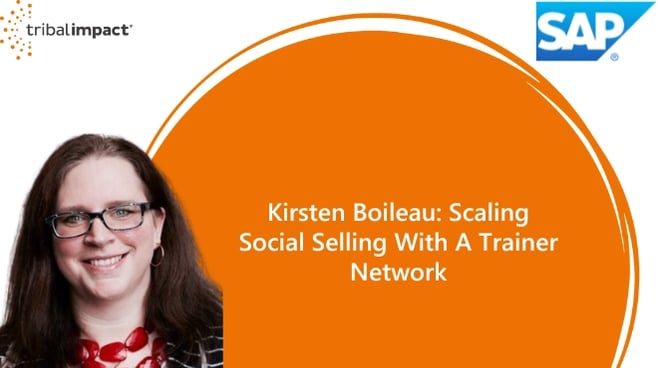
Kirsten Boileau: Scaling Social Selling With A Trainer Network
Kirsten has been a part of the digital revolution in the B2B space for the past 5+ years – leading the change at SAP as Global Head of Digital Enablement Services. We’ve worked together for several years, we have kids the same age (she’s met my kids) – she’s a good all-round, nice person who gets on with people whilst getting things done. When you have to scale a Social Selling program to thousands of employees around the world, you have a methodology and that’s what I’m going to explore today in my campfire chat.
Carving Her Own Role
Kirsten told me that she got thrown into social media marketing in 2012 after coming back off maternity, working with people that were experimenting with social selling. As she got more into it, she wanted to see how it could help her as a business development executive, so the next year she started to apply it.
“I never met my call numbers, by the way, once I started using it, and I hit 500% of my quota.”
In 2014 SAP decided to really embrace social selling and so she asked to be a part of it and ended up leading the program in July of 2014 - something that’s been a thrill and honour to do alongside her sales-side partner, Phil Laurie, since.
Platforms Change But Selling Hasn’t
Since then, Kirsten’s noticed that lots of things have changed. LinkedIn Sales Navigator looked nothing like it does today, even though they thought it was amazing at the time. There also wasn’t much content to share back then but we now have tools to curate and share content easily with our networks - to have those conversations.
But she believes that the main concept of being a digital or social seller hasn’t changed. And that’s to build yourself a good brand, listen to your customer - which often gets missed - and then share and engage in the conversation.
“I'm happy because it means that the ways that we engage with other human beings are still the same, no matter what platform we're using.”
Is Social Selling Still Selling?
I see so many different terms being used interchangeably - digital selling, social selling, modern selling. Is it just selling? Is it not selling at all? I asked Kirsten to clear this up for me!
Her view is that “It's all about building relationships, and so selling really doesn't come into it. Because if you build good relationships, people will buy from you no matter what.”
Kirsten believes though that terms help people understand what you mean. At SAP they use “digital selling” because they use much more than social platforms to engage with customers. But even though it’s really digital engagement and it involves sales and marketing, people understand “digital selling”.
I shared that we also have to speak the same language with clients, such as in regulated industries that won’t even entertain “social selling” - instead it’s “relationship development” or “relationship building”.
The Secret To Scaling To 16,000 Licences
Kirsten's taken SAP’s social selling licences from just a few hundred to 16,000 so I wanted to know her secret!
She shared that she started off flying around the world trying to train everyone but her manager quickly pointed out that he didn’t have the travel budget and she’d burn out pretty quickly!
“And so, I worked with LinkedIn and we came up with this idea to build up a trainer network...And I think we started with 50 people around the world who could deliver training in their various locations.”
Kirsten feels it was also good from a culture perspective. They could add regional flavours to presentation slides and trainers speaking the same language could really get the meaning across, which was so important.
Doing so meant they built the trainer network up to about 50 in the first year (2015) and 250 by the end of 2017.
Selecting The Trainers
Kirsten told me that their trainers tend to be marketing people nominated by leadership in each region. But they make them apply as they’d discovered early on that being nominated doesn’t necessarily mean that they’d be good trainers.
“And so, having people that were comfortable in speaking in front of a group of people, is one thing, but then also being comfortable speaking in front of sales - who are not necessarily the gentlest of folks in their feedback - that's really important.”
The trainers didn’t just graduate the program either. They were given one of four levels with different “training rights”, such as whether they need to do more learning or work alongside someone. Kirsten felt this was really important as they were putting their reputation on the line so the training needed to be really powerful and valuable for sales.
When training the trainers, they also made sure that they used sales-oriented language as things like reach and impressions mean nothing to them. Kirsten felt it comes back to what we spoke about earlier:
“You know, speaking that common language is really, really important. And so, the same thing goes for our trainers.”
Always Curious
I told Kirsten that I love how she’s what we call a “Steady Eddy” in the UK. She’s level-headed, reliable and rarely fazed. She’s driven by a mission and passionate about her role.
So, what drives her?
“I am always curious. I am always looking to learn new things... It doesn't necessarily have to be a super intense course or anything like that, but now I'm looking to learn from my kids and what they're doing...I just truly have that growth mindset.”
Kirsten admitted she even learns new and cool things from her eight-year old twin daughters and is discovering more about woodworking because of her son.
“I am never satisfied with the status quo. I'm always looking to improve. How can we do things differently? How can we do it better? How can we do it more efficiently? That has been something that has driven me all through my life.”
She even had a growth mindset when mucking horse stalls straight out of university, looking for ways to be more efficient and have less wastage. She just didn’t know it at the time.
Life Hacks
With a full-time, global role that involves travelling and different time zones, I wanted to know some of her life hacks for juggling this and three kids.
Kirsten recommends working from home if you can as it cuts down a lot of time away from your kids - she helps hers get ready for school and then gets to work immediately.
She also revealed: “I have a massive, figuratively, village around me to support me in doing what I love to do.” For example, her mum helps with the kids and her husband makes dinner (who’s a chef by trade!).
But she believes that people are willing to help because she’s truly happy with and loves what she does and that means that people want to support her and help her grow and be successful.
The Episode:
[02:37] Carving Her Own Role
[04:14] Platforms Change But Selling hasn't
[05:46] Is Social Selling Still Selling?
[07:43] The Secret To Scaling To 16,000 Licences
[09:12] Selecting The Trainers
[12:01] Always Curious
[14:49] Life Hacks
Resources Mentioned:
-
Kirsten Boileau on LinkedIn
-
Kirsten Boileau on Twitter

